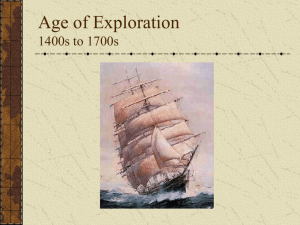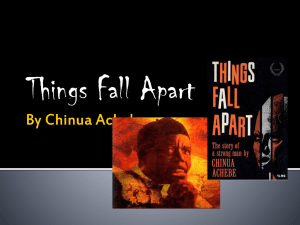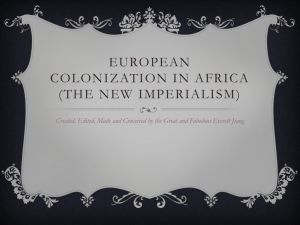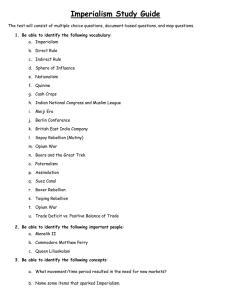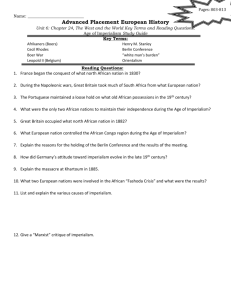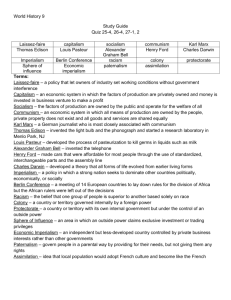Africa - Mr. Weiss - Honors World History
advertisement
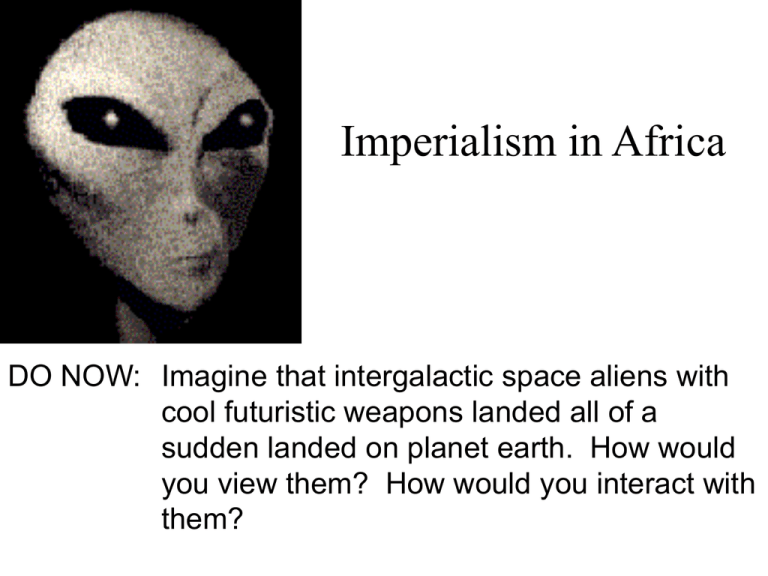
Imperialism in Africa DO NOW: Imagine that intergalactic space aliens with cool futuristic weapons landed all of a sudden landed on planet earth. How would you view them? How would you interact with them? Review: WHII.11: Describe the causes of 19th Century European Imperialism •The desire for economic gain and resources •The missionary impulse •The search for strategic advantage and national pride Today: WHII.15: Identify major developments of African history in the 19 th and early 20th centuries. •Africa’s interaction with imperialism •Agricultural changes and new patterns of employment •The origins of African nationalism Up until the late 1800s, there were just a few European colonies on the African coastline. No Europeans had really explored the interior of what they called the “Dark Continent”. In the early 1880s, King Leopold II of Belgium paid for expeditions to the the Congo in the center of the African continent. He claimed that, “millions of men still plunged in barbarism will be at the dawn of a better era.” We come in peace – We swear! But he really wanted the Congo’s natural resources: copper, rubber and ivory. He forced the locals to work for almost nothing and had them killed and tortured if they complained or disobeyed. Remember “The White Man’s Burden”??? Which one do you think is more accurate? Many Africans gave up traditional agriculture to work for European companies. Some worked on rubber plantations or in copper mines. Others built railroads to bring these natural resources to ports, where they could be shipped to Europe and used in factories. Berlin Conference (1884): European countries decided they could claim African colonies just by setting up government offices in African territory. This set off a Great Scramble as Europeans rushed to colonize Africa. Why??? By 1914, there were only two independent countries left in all of Africa. What new countries were growing empires? “We do not want to put anyone in the shade, but we also demand our place in the sun” –Germany Where do these lines come from??? -British Official “We have been engaged in drawing lines upon maps where no white man’s foot has ever trod. We have been giving away mountains and rivers and lakes to each other, only hindered by the small impediment that we never knew exactly where the mountains and rivers were.” Europeans: Carving up a Continent Who is missing from this picture??? Many Africans fought back: “I have listened to your words but can find no reason why I should obey you – I would rather die first… If you desire friendship, then I am ready for it, today and always. But I cannot be your subject. If you desire war, then I am ready.” -Chief Machemba (1890) What do you think happened? Remember? “Whatever happens, we have got the Maxim gun, and they have not.” When Africans rebelled, Europeans killed thousands of Yao, Zulu, Asante, Shona, Herero, and Maji-Maji people. Ethiopia was the only exception… Emperor Haile Selassie I “Conquering Lion of the Tribe of Judah, King of Kings of Ethiopia and Elect of God” “Ras Tafari” Halie Selassie’s cousin, Emperor Menelik II, had modernized Ethiopia by hiring Europeans to build roads, bridges and schools. He bought weapons from Great Britain to fight the Italian invaders, and defeated the Italians in 1896. When Italy invaded again in 1935, Haile Selassie I made a famous speech to the League of Nations. Bob Marley used his speech as lyrics to a song, “War” “That until the philosophy which holds one race superior and another inferior is finally and permanently discredited and abandoned: That until there are no longer first-class and second class citizens of any nation; That until the color of a man's skin is of no more significance than the color of his eyes; That until the basic human rights are equally guaranteed to all without regard to race; That until that day, the dream of lasting peace and world citizenship and the rule of international morality will remain but a fleeting illusion, to be pursued but never attained…” “And until the ignoble and unhappy regimes that hold our brothers in Angola, in Mozambique and in South Africa in subhuman bondage have been toppled and destroyed… Until that day, the African continent will not know peace. We Africans will fight, if necessary, and we know that we shall win, as we are confident in the victory of good over evil.” Haile Selassie was an example for the rest of Africa. Today, every African nation is free and independent. Yet there are still many problems in Africa today. From looking at these maps, can you think of one reason why? WHII.15: Identify major developments of African history in the 19th and early 20th centuries. •Africa’s interaction with imperialism •Agricultural changes and new patterns of employment •The origins of African nationalism HOMEWORK: Use your Do Now, your notes, and the lyrics to Bob Marley’s “War” to explain how European imperialism affected African Nationalism. Extra Credit: Make a connection to Napoleon!


